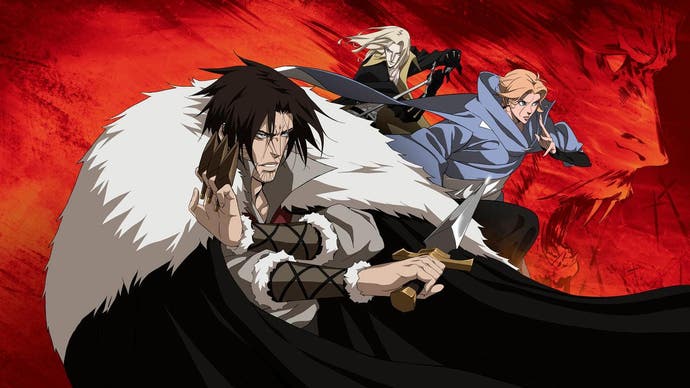Castlevania's Netflix show is weird and flawed but it totally works
Come and have a go if you Alucard enough.
The Netflix adaptation of Castlevania is kind of weird.
It feels like a pilot episode inexplicably chopped up in four places. The first season literally ends with the iconic cast coming together to prepare for the inevitable battle against everyone's favorite antagonist. Needless to say, Warren Ellis' loose retelling of Castlevania 3: Dracula's Curse seems to have garnered polarising opinions. Some people thought the gore (and there's a gleefully gratuitous amount of that) was on-point. Others thought it was unnecessary. Some loved the animation. Others abhorred it. And I'm not even going to get started on the pacing, dialogue, character design, and adherence to the source material. (The music. What on earth happened with the music?)
Personally, though? I thought Netflix's Castlevania was competent television. Not great, mind you. Competent. If we were doing numbers - and hey, why not - it was a seven-point-five in most places, an eight in some, and the occasional 'I guess this could be so much worse' five in a few spots. For the most part, I enjoyed the art direction. It could be my natural predisposition towards furry capes, however, and a fondness for practical-looking fight scenes. (Caveat: I'm not particularly impressed with the final showdown.)
Still, what impressed me was the fact that it didn't feel like the people behind the Castlevania animation were banking on the idea of established fans.
I mean, sure. There's fan service. How could there not be? But it doesn't come across as insider-y, if you know what I mean? At no point during the viewing experience did I tilt my head, frown puzzledly at the screen, and wonder about the implications of an action, a phrase. You could binge-watch the whole shebang without a lifetime of devotion to the games.
And that's a great thing.
But okay, enough about that. Let's break down the Castlevania animation a little. Each episode pivots around a different character. In the very first one, we have Dracula himself, reimagined as a semi-sympathetic individual who falls in love with a scholastic young woman. Their relationship doesn't last. Five minutes later, she's dead, burned alive as a witch, and Dracula's left to mourn in, at least in the context of undead lords of the night, a somewhat reasonable fashion.
He goes back to his wife's murderers and informs them that they have precisely a year to evacuate before he brings the world down around their ears. Dialogue-wise, this isn't Castlevania's best showing. Dracula repeats the phrase 'one year' so many times, it feels like he's worried about the condition falling on deaf ears. And there's that whole conversation about fornicating with livestock, which got far too much screen time for my liking.
That said, the episode does a fantastic job at illustrating precisely how violent the series will be, happily raining viscera on all and sundry. It also introduces Trevor Belmont, brilliantly voiced by Richard Armitage, towards the end.
I adore Trevor. The 'disgraced scion turned wandering drunk' is a familiar trope, but Trevor really sells it here. He doesn't seem so much despairing of lost glory, as he is despairing of the fact he can't get drunk without getting into trouble. He's a hot mess of a human being. He gets the stuffing kicked out of him before he staggers outside and throws up from his exertions. Armitage does a lot to provide Trevor with the right mix of insouciance and gravity, hinting at the kind of man the last son of the Belmonts once was.
Tangentially related, episode two has an incredibly fun sequence with a whip and two priests. (Wait, that was weird.)

I'm less enamoured of the Speakers, who feel like they were invented for the sole purpose of reminding us that the Church of Wallachia is comprised of assholes. It's not that I take any offense at all this. It's just that between the thug-like behavior of the priests, their blatant adherence to blind dogma, the fact they happily burned a woman on the stake, and the lack of disaster relief efforts following the slaughter they instigated? It all feels a little unnecessary.
Still, we get more Trevor, and we get a look at the consequences of Dracula's wrath. It's grim. There are babies stolen from their beds, disemboweled bodies piled into canals, missing spouses, and no end of desperate people. Trevor finds himself tasked with recovering a missing grandchild, and this leads him down into the bowels of the city, where he suffers an encounter with a cyclops.
I'd go on about the remaining episodes, but we're firmly into spoiler territory at this point. Castlevania works. There's a deliciously profane sequence in a church that borders on absurdism, a monumental bit where Trevor rallies the peasants against the enemy, and what looks to be a nod towards the platforming elements in the games. If you want to be picky, there are a hundred places where the Netflix adaptation goes wrong. (Jesus, that dialogue, sometimes.)
But again, it works.
More than anything else, the first season feels like an attempt to both sell the series to network executives and fans unfamiliar with the source material. Will the second season be better? I don't know. We'll find out soon enough, though, and I'm excited to see what's next.


